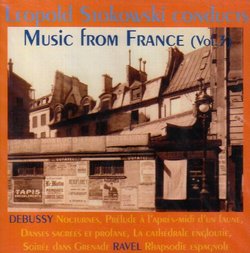| All Artists: Stokowski Title: French Music 3 Members Wishing: 0 Total Copies: 0 Label: Biddulph Records Release Date: 8/19/1994 Genres: Dance & Electronic, Classical Styles: Forms & Genres, Short Forms, Historical Periods, Modern, 20th, & 21st Century, Instruments, Keyboard Number of Discs: 1 SwapaCD Credits: 1 UPC: 744718301324 |
Search - Stokowski :: French Music 3
CD Details |
CD ReviewsFrom the Liner Notes by Mark Obert-Thorn Record Collector | Mons, Belgium | 09/04/2005 (5 out of 5 stars) "It is in the works of the Impressionists that Stokowski's particular gift as an orchestral colourist really comes to the fore. These 1937 recordings of the Nocturnes drift more languorously than on his 1930 discs, & the middle piece begins at a higher voltage. In the third Nocturne, Stokowski builds the tension inexorably, ultimately finding release in a soothing, sensuous balm. Sensuality is the order of the day for the Faun, particularly in this 1940 version, here released for the first time. Stokowski & the Philadelphians recorded the work no fewer than six times during the 78-rpm era. The first (unpublished) version, made in 1917 when Debussy was still composing, was taken down on three sides. All subsequent recordings (a 1924 acoustic, a 1927 electrical remake, unissued versions of 1936 & this one from March 1940, & the final issued takes from December 1940) attempted to cram Stokowski's expansive interpretation onto two 12-inch sides, with mixed results. The version presented here is more broadly paced--& ultimately, more satisfying--than any of the editions published hitherto. It was most likely withheld from release because the length of its sides ran dangerously close to the centre label area. The flute soloist in this performance is the great William Kincaid who, while growing up in Hawaii, developed his superb breath control by training as a swimmer under the tutelage of an Olympic athlete. He was engaged by Stokowski in 1921, & remained with the orchestra until 1960, having stayed long enough to be on hand for the conductor's return to Philadelphia after his self-imposed 19-year exile. A broadcast performance of Faun from this series runs precisely as long--10'48'' to the second!--as the recording included here. The two Danses for harp & string orchestra, on the other hand, are here presented in Stokowski's sole recording thereof. They spotlight the talents of Edna Phillips who had just become the first distaff member of the Philadelphia Orchestra. Stokowski's orchestral realisation of La cathedrale engloutie calls to mind the 'fog & drizzle' of Vaughan Williams's London Symphony. The transcription of Soiree dans Grenade, made during Stokowski's final recording session with the orchestra before his two-decade leave, was never released on 78s, & survives only a rare test pressing. The work draws on the same Iberian dance forms which were to inspire Ravel in his Rapsodie espagnole. During the 1920s & 1930s, the Victor label practised a strange ghettoisation of repertoire between Stokowski & Serge Koussevitzky with the Boston Symphony Orchestra. The Russian conducted all of Victor's Prokofiev recordings, while the British expatriate presided over Shostakovich. Similarly in the French repertoire, Ravel 'belonged' to Koussevitzky (due in no small part to their personal friendship & the conductor's commissions), while Stokowski cornered the market in Debussy--with one major exception in each case: Koussevitzky recorded La mer, & Stokowski was vouchsafed Rapsodie espagnole. The latter turned his sole opportunity into one of the most memorable & exciting ever put on disc. Except for the Debussy Danses, Stokowski would re-record each of the works here--some, several times over; all, ultimately, in stereo. These Philadelphia 78s, however, bear witness to a unique relationship between conductor & ensemble, one which was nearing the end of its third decade when the recordings presented here were made. Although Stokowski was said to be able to make any band 'play like the Philadelphian,' the peculiar incandescence of their chemistry was never quite duplicated; & nowhere was this joint magic more potently worked out than in the works of the French impressionists.
" |

